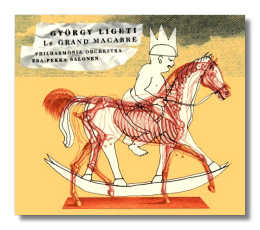
The Internet's Premier Classical Music Source
Related Links
- Ligeti Reviews
- Latest Reviews
- More Reviews
-
By Composer
-
Collections
DVD & Blu-ray
Books
Concert Reviews
Articles/Interviews
Software
Audio
Search Amazon
Recommended Links
Site News
 CD Review
CD Review
György Ligeti

Le Grand Macabre (1997 version)
- Willard White (Nekrotzar)
- Derek Lee Ragin (Prince Go-Go)
- Graham Clark (Piet the Pot)
- Jard van Nes (Mescalina)
- Frode Olsen (Astradamors)
- Sibylle Ehlert (Venus, Gepopo)
- Laura Claycomb (Amanda)
- Charlotte Hellekant (Amando)
- Steven Cole (White Minister)
- Richard Suart (Black Minister); others
London Sinfonietta Voices
Philharmonia Orchestra/Esa-Pekka Salonen
Sony Classical S2K62312 DDD 2CDs 43:12, 59:15
With this work avant-guarde composer György Ligeti presents "opera." (He put quotes around the word himself.) Ornery to the core, Le Grand Macabre uses musical instruments to simulate non-musical effects. Before its scenes there are two car horn Préludes and a doorbell Prélude. These frisky and brief introductions are amusing in the same way as Marcel Duchamps' famous found urinal sculpture. In fact, the entire plot is retro-Dada: Piet the Pot, a forever tipsy, professional wine-taster, is abducted by Nekrotzar, the Great Macabre, a personification of death. We meet court astrologers who engage in S & M and a confused Prince Go-Go, who reigns in Breughelland, a place where the two political parties have no differences at all. (Sound familiar?) This anti-music is cacophonous and occasionally clever, such as a concluding Passacaglia done in mock classical style. Squawking sprechtstimme inflates the non-musical segments with volume lacking substance. Inevitably, the work's constant anarchic energy wears thin. There is just too much grunting, squealing, and fall-flat satire. Thirty five years ago I anticipated hearing Le Grand Macabre for the first and only time and wrote: "Always in the melting hour/There are eons of ten minutes to endure."
Copyright © 2001, Peter Bates


















